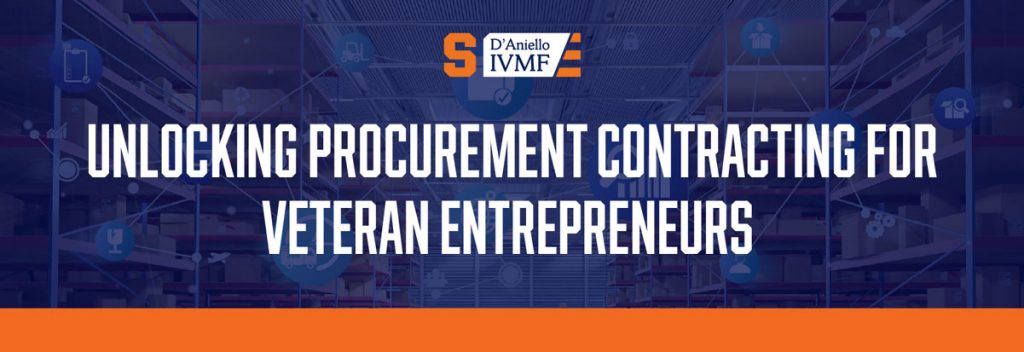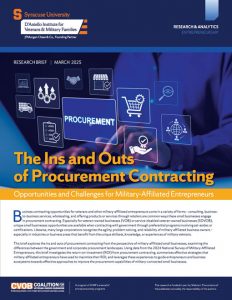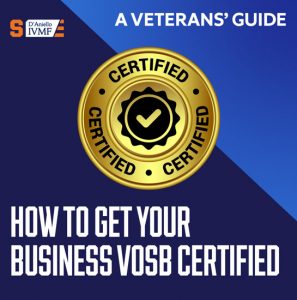Procurement contracting offers a wealth of opportunities for veteran entrepreneurs, providing avenues to grow their businesses through government and corporate contracts. This blog post provides a high-level overview of the procurement contracting landscape, highlighting the most relevant information for veteran-owned businesses (VOBs) and service-disabled veteran-owned businesses (SDVOBs).
Understanding Procurement Contracting
Procurement contracting involves securing contracts to provide goods or services to government agencies or large corporations. For veteran entrepreneurs, these contracts can be a game-changer, offering stable revenue and huge growth potential.
The 2025 IVMF Research Brief The Ins and Outs of Procurement Contracting: Opportunities and Challenges for Military-Affiliated Entrepreneurs delves into the opportunities and challenges military-affiliated entrepreneurs face in the procurement landscape in more detail, and is worth checking out.
Government Contracts: A Pathway to Growth
Government contracts are a significant opportunity for veteran entrepreneurs. The federal government reserves a portion of its contracts for small businesses, including specific programs for businesses owned by veterans. These reserved contracts are typically called “set-asides”, and generally require a Veteran-Owned Small Business (VOSB) Or Service-Disabled Veteran-Owned Small Business (SDVOSB) certification from the US Small Business Administration (SBA). You can learn more about that process and benefits in this IVMF blog.
Veteran entrepreneurs report that government contracting is more reliable, and yields higher average revenue when compared to corporate contracting, although more upfront investment is often necessary. Key federal procurement programs include:
- Service-Disabled Veteran-Owned Small Business (SDVOSB) Program: Provides set-asides for small businesses owned by disabled veterans.
- 8(a) Business Development Program: Supports socially or economically disadvantaged businesses, including veteran-owned businesses, with opportunities like sole-source contracts.
- HUBZone Program: Supports businesses in historically underutilized areas for federal contracting.
- Woman-Owned Small Business (WOSB) Program: Offers exclusive federal “set-aside” contracts for woman-owned businesses in specific industries.
Navigating the government contracting process involves conducting market research, registering at SAM.gov, obtaining relevant certifications, and submitting comprehensive responses to Requests for Proposals (RFPs) and Requests for Quotes (RFQs).
Corporate Contracts: Flexibility and Profit Margins
Corporate procurement offers a different set of opportunities. Large corporations often have supplier development or supplier diversity programs that emphasize working with a wide range of small businesses, some even focused specifically on veteran-owned businesses. Veteran entrepreneurs report that corporate opportunities have higher profit margins and fewer regulatory hurdles, but can be less reliable.
Walmart is one of the biggest corporate procurement opportunities in the US market today. The good news is, they’re holding an open call, which you can learn all about.
Other opportunities in corporate procurement contracting include:
- Supplier Development Programs: Increase spending with small businesses through direct procurement, indirect procurement, and operations procurement.
- Corporate Social Responsibility (CSR): Creates additional opportunities for small businesses that align with corporate CSR goals.
- Industry Associations and Networking Events: Small businesses can connect to corporate procurement contracts through events and associations.
Corporate procurement processes are typically more flexible than government procurement, focusing on relationship-building, past performance, and alignment with corporate goals.
Strategies for Success
Veteran entrepreneurs can maximize their return on investment (ROI) from procurement contracting by employing effective strategies:
- Building Relationships: Use networking events or similar opportunities to develop strong relationships with key suppliers and contracting offices to foster collaboration and innovation.
- Pricing Strategies: Establish effective pricing structures and negotiate performance-based contracts to unlock additional revenue streams when planning contracts.
- Efficiency and Planning: Streamline operations and leverage technology to improve efficiency and reduce costs.
- Leveraging Technology: Utilize data and automation to spot cost-saving opportunities and predict disruptions.
- Supplier Management: Regularly evaluate suppliers based on performance metrics and diversify suppliers to mitigate risks.
Challenges and Solutions
Both government and corporate procurement present unique challenges. Government procurement often involves complex bidding processes and compliance requirements, while corporate procurement struggles with limited access to key decision-makers and a lack of awareness about available contracts. Veteran entrepreneurs can overcome these challenges by seeking mentorship, engaging in training programs, and advocating for simplified procurement processes.
Conclusion
Procurement contracting offers veteran entrepreneurs a pathway to business growth and stability. By understanding the opportunities and challenges, employing effective strategies, and leveraging available resources, veteran-owned businesses can thrive in both government and corporate procurement landscapes.
For more information and resources on procurement readiness, visit the IVMF’s Procurement Readiness page!


